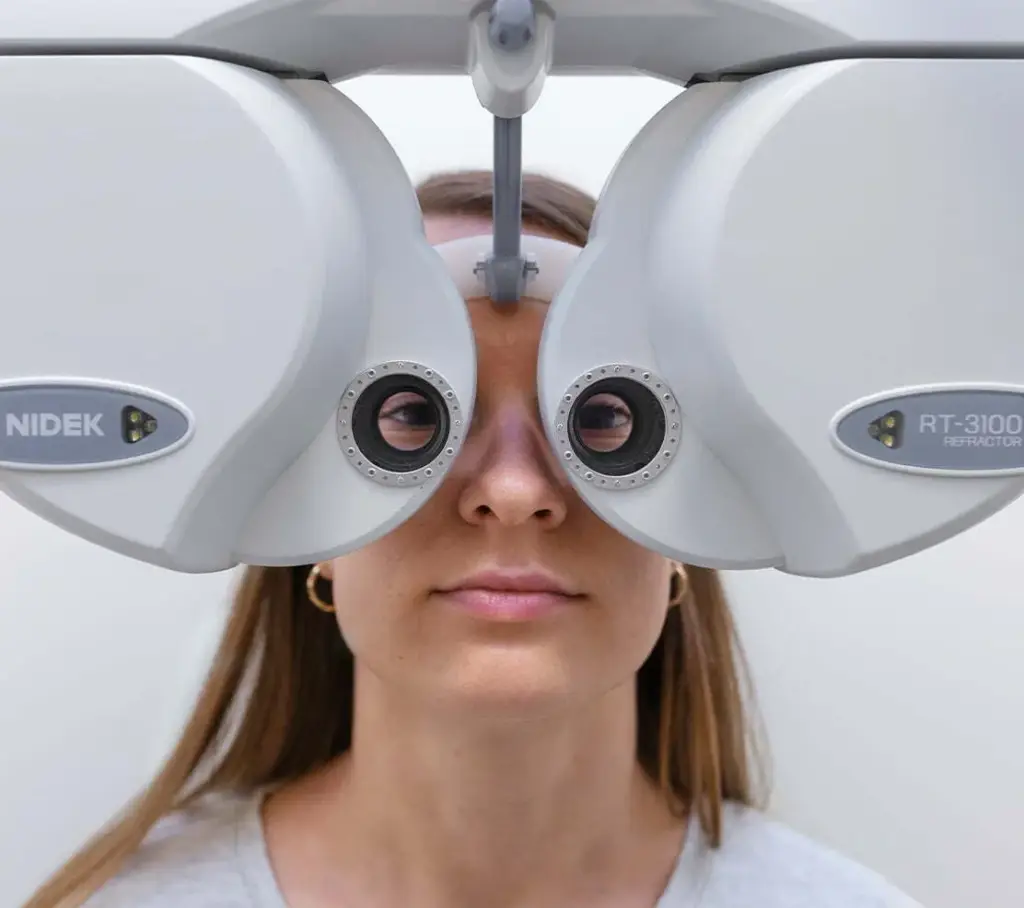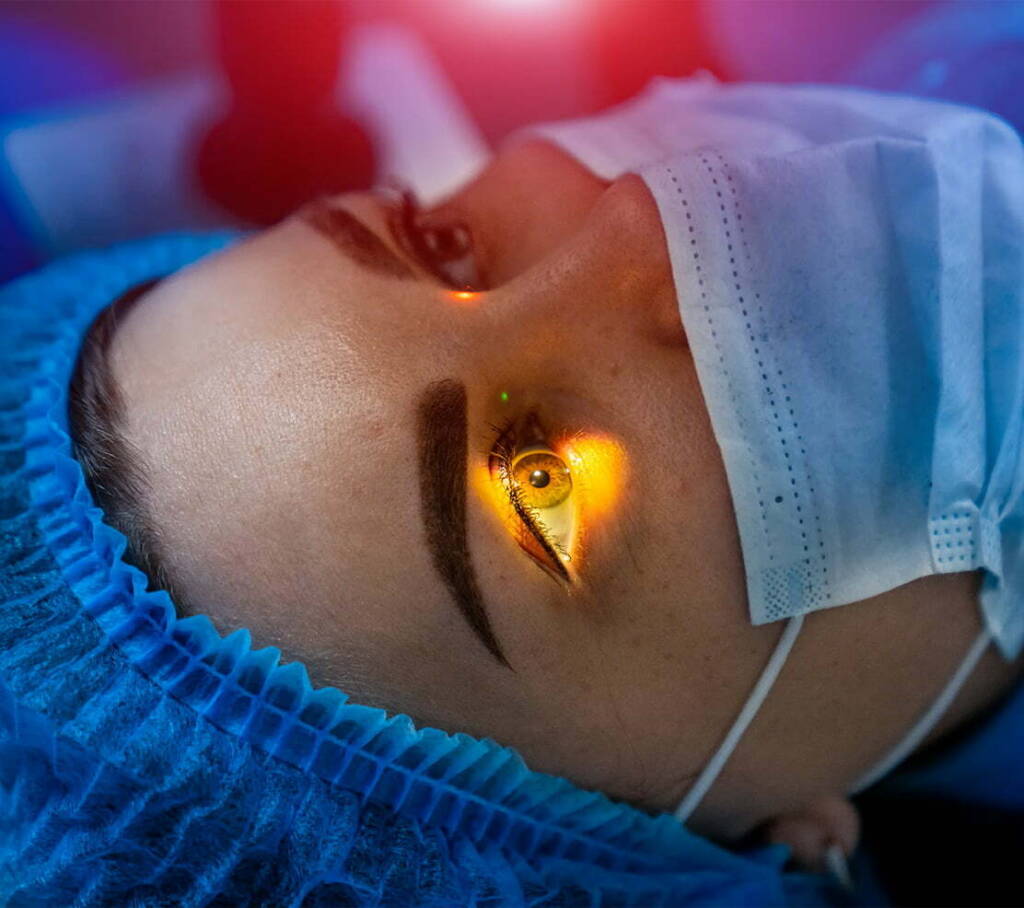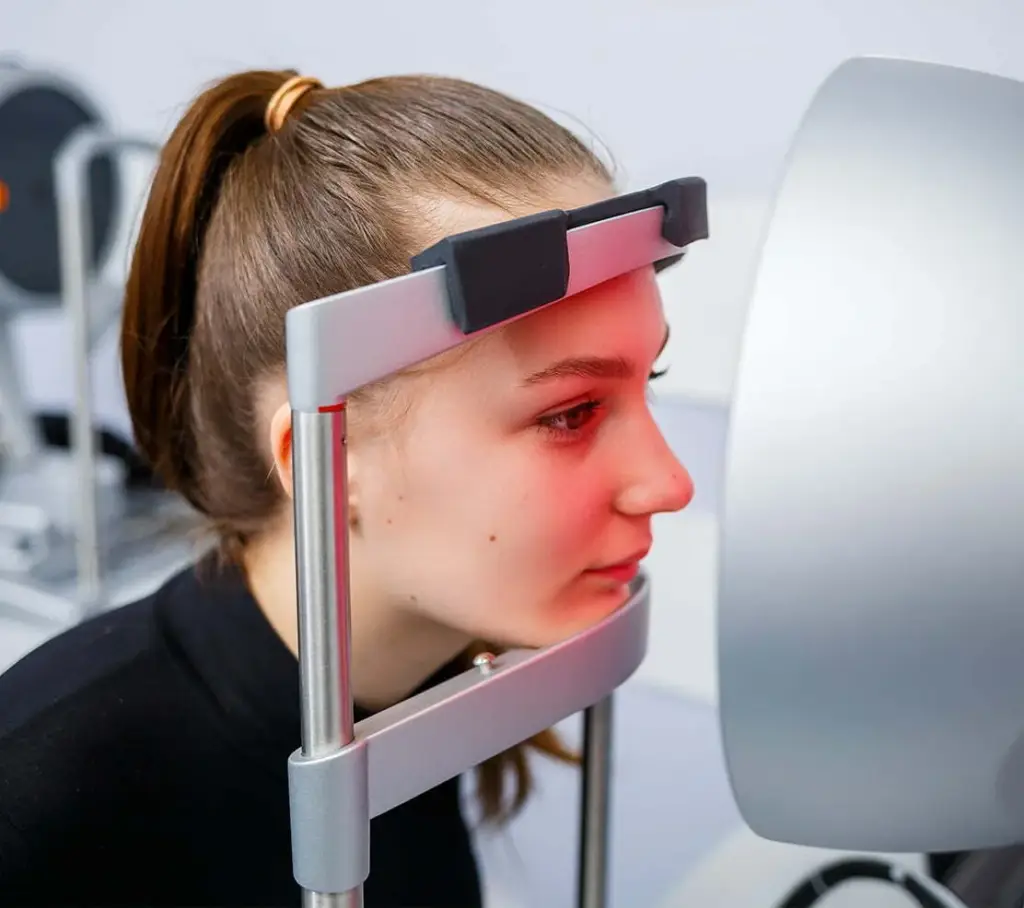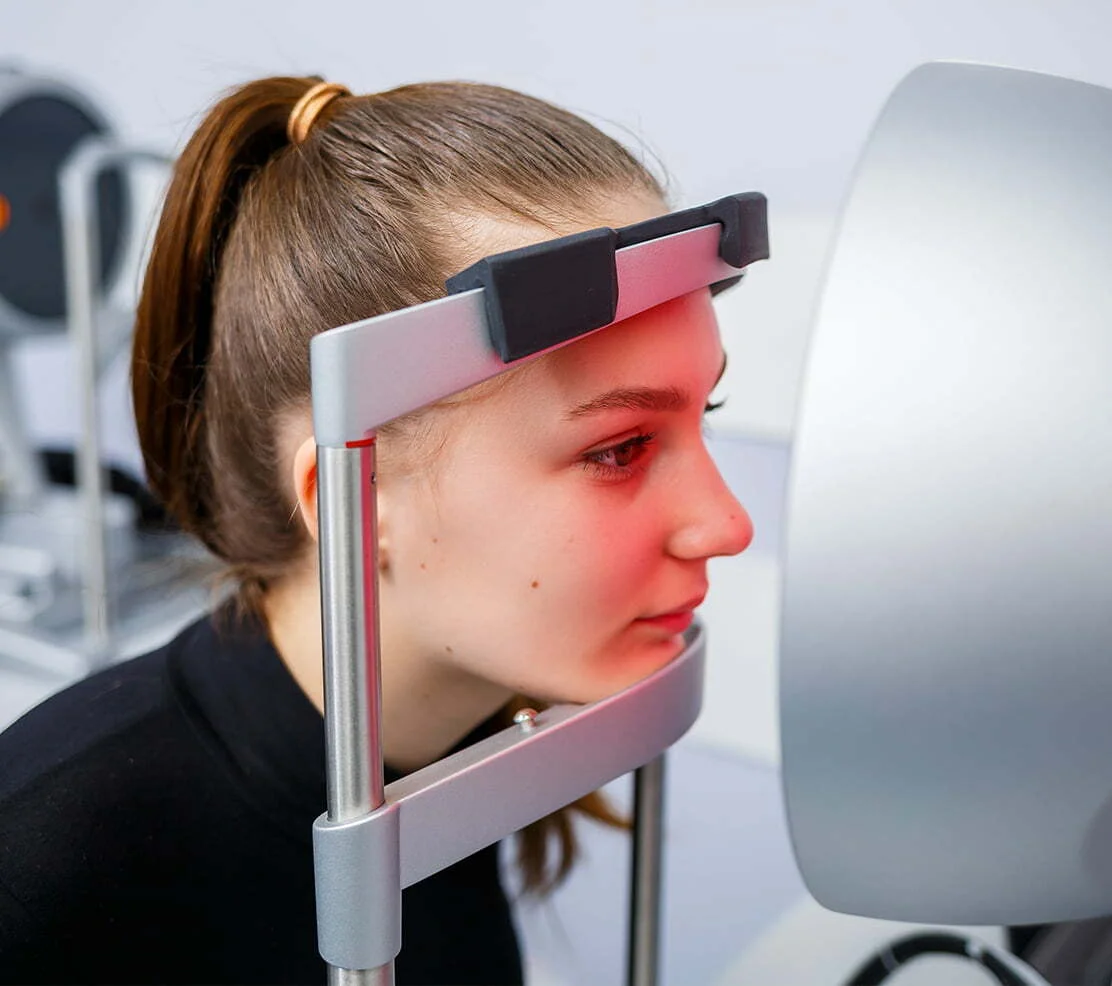Although you may have put off getting laser eye surgery for months or even years, the actual operation only takes up to 45 minutes. Before you know it, you’ll be glancing at the clock and marveling at how you can determine the time without your glasses or contacts.
Myopia, hyperopia, and astigmatism can all be treated by laser eye surgery, also known as laser vision correction. By correcting vision problems, laser eye surgery frees you from wearing glasses or contact lenses so you can enjoy life to the fullest.
By reshaping the cornea, the clear layer that filters light with a laser beam, laser eye surgery offers the treatment of myopia (difficulty seeing long distances), astigmatism, and hyperopia (difficulty seeing short distances) disorders. The patient benefits from having a clear vision and accurate concentration.
Stages of Laser Treatment :
Step 1: Tests
Topography tests allow for the acquisition of a precise topographic map of the cornea layer. A pachymeter is used to test corneal thickness. When choosing the surgical approach, corneal thickness is just as crucial as the number of diopters.

Step 2: Examination
A thorough eye examination is performed based on the information obtained from the three exams after they are finished. The examination determines the visual acuity, diopter values, and binding measures. After performing a biomicroscopic examination, eye pressure is then measured.
In-depth questions are raised about age and the prevalence of systemic diseases including diabetes, goiter, and hypertension. When necessary, wavefront or Topolaser tests are carried out.
Step 3: Eye Examination with Eye Drop
After using an eye drop to dilate the pupils, the eye ground is observed from the pupil up (including the retinal vessels and nerve layer) and the diopter values are evaluated again after about 30 minutes. Risky retinal conditions like thinning, detachment or holes are fixed with the argon laser technique. The excimer laser therapy may need to be delayed by three weeks after argon laser administration, although the procedure is unaffected. It makes the process safer.
The refractive surgeons examine all the information gathered from such examinations and analyses, which all take place over the course of two to three hours, and then choose the best course of action. It’s possible that the laser treatment won’t be used the same day because the eye drop enlarges the pupils, and it takes some time for them to shrink back to their regular size. The earliest date for the procedure is the next day.

Step 4: Decision of Surgery
Experts that specialize in laser surgery decide on your procedure and the technique to be utilized after evaluating the test and examination findings.
During the Treatment
Depending on the degree of adjustment needed, the easy operation can take just a few seconds to a few minutes, but the improvement in your vision you experience following laser eye surgery is absolutely incredible.
The patient is asked to lie on the special laser table as soon as they enter the laser room. In order to prevent the patient from blinking during the procedure, the patient’s eye is covered with a sterile cloth and the patient’s eyelids are safely and specifically parted. The patient has no pain or discomfort during the 4-5 minute laser treatment for each eye. It is crucial that the patient is at ease during the procedure and adheres to the doctor’s directions. The patient exits the laser room without having their eyes bandaged when the procedure is over.
Most laser eye surgery patients see clearly within 1-2 weeks and 80–90% of their greatest possible clarity the day following their procedure. To get the finest optical quality, though, it can take three to six months.

The First Day Following Treatment
After the laser treatment, the patient waits for around 30 minutes before being inspected for control purposes. After the control exam, the patient is free to leave the hospital. For three to four hours, having blurry vision, stinging, searing discomfort, and watery eyes is typical. It is important to pay close attention to the doctor’s instructions before taking any medication. If you experience any headaches following your laser surgery, you can use a pain reliever that does not contain blood thinners.
On the day of the procedure, we advise the patient not to drive or show up for work. Any dusty atmosphere should be avoided by the patient. During the first 24 hours, the patient shouldn’t wash their faces, touch, rub, or scratch the treated eye. They also shouldn’t take a shower or bathe. During the first few days, special care should be taken to avoid getting shampoo or soap in the eyes.
There won’t be any adverse effects a day after surgery that limits the patient’s social or professional life. The region under the flap may need to be cleaned if the doctors’ post-op examination the following day reveals any wrinkling on the transparent area of the eye or any reaction. This process is simpler than the operation.
The patient should use the teardrops prescribed by the surgeon for 6 to 9 months.

Who can receive laser treatment?
- Individuals that are older than 18
- Individuals with an appropriate corneal thickness
- Individuals who have up to -10 diopters of myopia
- Individuals up to 6 diopters astigmatic
- Individuals with up to +4 diopters of hyperopia
- Individuals whose eyeglass prescription has stayed mostly constant for at least two years.
- Individuals who do not suffer from chronic illnesses like diabetes or rheumatism
- Individuals without any other eye conditions (corneal sharpening, eye pressure, etc.)
- Individuals who aren’t expecting or nursing
Laser eye surgery comes in a variety of forms, including LASIK, I-LASIK, SMILE, and surface laser treatments.
LASIK – Two lasers are used during LASIK (laser in-situ keratomileusis), one to reshape the cornea beneath and the other to open up a tiny flap on the cornea’s surface. The protective flap is then repositioned and secured without the use of stitches.

I-LASIK – In order to give our patients the safest, most precise laser eye treatment possible, New You Now’s team of skilled eye surgeons uses the most recent LASIK technology and tools. This operation is the first one that completely corrects vision and is tailored to each person’s unique eye features. For utmost precision, it is carried out using a wavefront-guided blade-free laser that has received FDA approval. You can get the safest and most effective results from Lasik surgery using the I-Lasik technique.
The majority of patients recover 20/20 vision or better, and practically all eye vision correction conditions can be treated with this operation.
SMILE – Through a tiny, self-sealing hole, the surgeon reshapes your cornea.
The transparent tissue that covers the cornea is removed during surface laser treatments (PRK, LASEK, and TransPRK) so the surgeon can use a laser to reshape your cornea. The tissue then naturally regenerates.
The most popular method for excimer laser refractive surgery to do away with the necessity for eyeglasses and contact lenses is LASIK. LASIK surgery has been the most common technique worldwide for almost 30 years because it is a simple, painless process that gives patients full visual performance in just a few hours.

What is the purpose of laser eye surgery?
Myopia (nearsightedness), hyperopia (farsightedness), and astigmatism can all be treated using laser eye surgery, sometimes referred to as Lasik eye surgery, by altering the cornea’s shape.
What age is appropriate for laser eye surgery?
25 to 40 is the best age range. By the middle of their twenties, the majority of people’s eye prescriptions will have stabilized, and following surgery, they won’t change further. People over 40 may be better candidates for other operations like lens replacement due to issues like presbyopia or cataracts.
How much time does it take to recover from laser eye surgery?
After surgery, a full recovery takes three to six months. However, most patients are able to return to their regular lives with near-optimal eyesight within 24 hours.
Can I be awake throughout the laser eye surgery?
Yes, because laser treatment only takes several minutes, it is performed using numbing eye drops and local anesthetic.
How Does It Work?
Day 1: New You Now team will pick you up from the airport and take you to your hotel.
Day 2: You will be brought to the clinic for a face-to-face consultation with your physician. To ensure everything is in order to move forward, pre-operative testing will be performed. Your procedure starts after this step. The eyes will be given local anesthetic by numbing eye drops, and the cornea’s flaws will be laser-corrected. The actual procedure only takes a short time.
Day 3: This is a free day of rest with a soft light. On this day, your vision will have mostly recovered.
Day 4: This is the day of your check-up. To meet with your surgeon for a checkup, you will be brought to the clinic.
Day 5: On your final day, you’ll check out and be driven to the airport for your flight home. To keep an eye on your healing, our aftercare team will get in touch with you.
What are the 2025 laser eye surgery prices with New You Now in Turkey?
Laser eye surgery prices in Turkey in 2025 can vary depending on the type of procedure performed—such as LASIK, LASEK, or ReLEx SMILE—and the patient’s specific vision correction needs. At New You Now, laser eye surgeries are performed by experienced ophthalmologists using cutting-edge technology to ensure precise and safe results.
The clinic offers all-inclusive pricing packages that typically cover pre-surgery eye examinations, the laser procedure itself, follow-up care, hotel accommodation, and VIP airport transfers. These packages are designed to provide international patients with a smooth, worry-free experience from arrival to recovery.
To find out which laser eye procedure is most suitable for you and receive full pricing information, it’s best to contact New You Now directly for a free consultation.
What is the best clinic for laser eye surgery in Turkey in 2025?
New You Now is regarded as one of the top clinics for laser eye surgery in Turkey in 2025, offering the latest technology in vision correction procedures such as LASIK, LASEK, and SMILE. The clinic is known for its highly skilled ophthalmologists, high success rates, and commitment to personalized care.
Whether you’re nearsighted, farsighted, or have astigmatism, New You Now provides a tailored treatment approach backed by detailed diagnostics and state-of-the-art laser systems. With comprehensive medical tourism packages that include VIP transfers, accommodation, and aftercare, it’s a trusted destination for international patients seeking long-term freedom from glasses or contact lenses.
Pre-Op Instructions
- In the weeks leading up to surgery, stop wearing contact lenses.
- It’s crucial for the cornea to be in its normal state prior to surgery. Many people are unaware that wearing contact lenses will alter the corneas’ shape.
- To speed up your healing, refrain from drinking and smoking.
- Wearing comfortable clothes for the appointment is recommended.
- Avoid using any items on your hair, skin, or fragrances that can affect the laser.
- Bring sunglasses.
- Sunglasses may be offered in some circumstances, however, carrying your own sunglasses comes in handy. After the operation, your eyes can be sensitive to light.
Post-Op Instructions
- To prevent your eyes from drying out, use eye drops frequently.
- Get lots of sleep. The greatest strategy for a quick recovery is to take it easy and get plenty of rest, as these are the times when the body’s natural healing recovery mechanisms are most active.
- Wait until you can see completely to drive before you do so.
- For the first week or two, try to limit screen usage; and for the first one or two days, try to completely avoid all screens.
- For at least a month, refrain from rubbing your eyes.
- To take a shower and wash your hair, wait at least a day. When you do, try your best to keep the shampoo, shower water, and soap out of your eyes.
- For a few weeks, refrain from using spas, whirlpools, hot tubs, saunas, and swimming pools.
- Take it easy and skip any physically demanding activities for the first 2-3 days.
- For at least a month, wear sunglasses in the sun.
- For at least a week, avoid being in very dusty or filthy places.
- For a week or two, avoid using creams or lotions near the eyes or wearing eye makeup.
- Use hair spray and shaving cream with caution.
- Give yourself a few weeks to recover before returning to sports again, and use eye goggles when playing contact sports for a few months.


